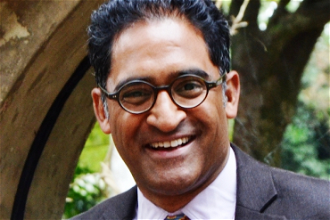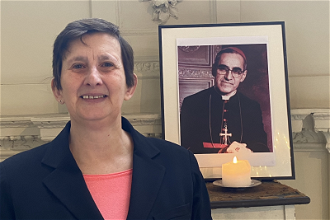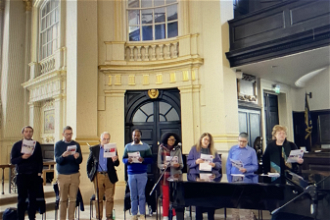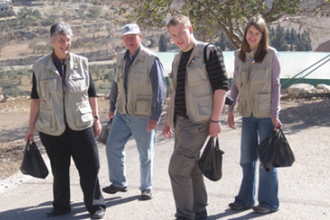Text: Peggy Healy gives Romero Week Lecture
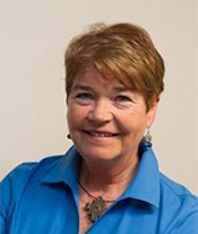
Peggy Healy
Peggy Healy gave the following lecture: 'Responding to the Cry of the Poor Today' for Romero Week, in Birmingham, Leeds, Glasgow, Liverpool, Waterloo and Canterbury.
Peggy was a Maryknoll Sister for over 20 years who knew St Romero who was martyred while saying Mass in March 1980, and she was a sister and friend of the four US women martyrs of El Salvador.
Maryknoll Sisters Maura Clarke and Ita Ford, Ursuline Sister Dorothy Kazel, and Lay Missioner Jean Donovan, missioned by the Archdiocese of San Salvador, were working in La Libertad and in Chalatenango, El Salvador with refugee victims of the war that had been raging for some time. They were threatened many times by military and paramilitary death squads for the gospel centered humanitarian work they were doing.
On December 2, 1980, nine months after Archbishop Romero was assassinated, the four women were picked up at the airport by the military, raped and murdered, and buried in a shallow grave in a deserted area in the countryside. That war raged on for many years after their deaths, and Peggy lost many other dear friends including the Jesuits who were martyred in El Salvador ten years after the women were murdered. Since living and working in Central America, she has worked as a nurse and later as a lawyer promoting human rights and accompanying excluded and marginalized communities around the world in their struggle for equality and justice and peace.
Thank you so much to the Romero Trust and to all of the sponsors of this program for inviting me and for all of the extraordinary work that you have been doing for so many years, embracing and raising up St Oscar Romero as a model Christian for our 21st century world.
But mostly, I want to thank each of you for coming today. The fact that you are in the room here today and interested in these Salvadoran martyrs-the fact that you are touched by their message-is oxygen for me-and it is a life-saving energy for the planet. For, as I look around me here today, I am clearly among saints and prophets again, as I have been my whole life. And I hope to be able to share some of that inspiration with you today.
I was fortunate to have 21 years as a Maryknoll Sister. I was missioned to Nicaragua in 1975, five years before my four friends, Maura, Ita, Dorothy, and Jean, were martyred in El Salvador. I lived with Maura Clarke in one of the poorest barrios in Nicaragua from 1975-1977 and I studied Theology for a year with Ita Ford in 1978.
When Maura and Ita both volunteered to go to El Salvador in 1979, I was working at the Washington Office on Latin America, which was a church sponsored human rights organization in Washington DC., and we planned that I would join them in El Salvador the following year. I visited Maura and Ita and Dorothy and Jean several times during 1979 and 1980. And I met Monsignor Romero more than once during that time. It was the Archdiocese that had asked the four women to undertake their life-saving mission among the refugee victims of the civil war that was raging there. I was with Maura and Ita and Dorothy and Jean in El Salvador in late November, 1980, just two weeks before they were martyred. The four of them picked me up at the airport and a few days later dropped me off at the same airport where the military picked them up the night of their martyrdom on December 2, 1980. It was a terrible, terrible time and a terrible, terrible loss. I never got to serve with them in El Salvador but I have gotten to witness the extraordinary impact that their martyrdom has had over these 40 plus years on countless people across the globe.
And the thing that moved me from the beginning--and that still moves me today--more than anything-is not their saintliness nor their holiness-but the profound humanity of Mgr Romero and the four women. Ordinary people living extraordinary lives. I remember clearly when Romero was named in 1977 as Archbishop of San Salvador and we, priests and religious throughout Central America, were all so deeply disappointed. He was, in our eyes, an academic who taught at the seminary, and who had little contact with the poor. We were desperately hoping for a different cleric to be named. But by the time I met Archbishop Romero in 1979, only two years later, he was already deeply revered by the clergy and the people of El Salvador. He had become a larger than life prophet and hero and I will never forget how, in the countryside, you could hear his Sunday sermons from out in the street because every battery operated radio in the vicinity was tuned into his weekly Sunday sermon from the Cathedral. A larger than life hero--but in fact he was not only somewhat small in physical stature but one of those people who would never ever stand out in a crowd. Never. He was simple. Humble. Present. Listening. But he had the impact of a giant. The impact of a saint.
The four churchwomen martyrs were also deeply human. Maura had a heart bigger than any one I ever knew, but God help you if you criticized the Irish! And Ita was a brilliant writer and editor, who was deeply spiritual, along with being splendidly ironic and irreverent when the situation called for it. Dorothy was unfailingly cheerful and brave amidst the constant violence, but she was very worried about the fact that she would be returning to the US, as her congregational mission tour was soon to be over. And Jean was engaged to be married to a doctor. She had documented way too many bodies tortured and left in the street, and she had agonized many times over leaving El Salvador herself, but she never could leave the refugee children behind.
They were all deeply touched by the courage and resilience and faith of the Salvadoran people but each one of them carried their own fears and insecurities-their deep internal wounds--as we all do-and they each struggled with their own demons. Like St. Romero, the women knew very well that they were in danger-they had received direct threats from the same death squads as Mons Romero, who had been gunned down while saying Mass only months before in March, and they were scared. But they persisted, their commitment endured, and they managed to even have a sense of humour about it. That last time I was praying with Maura and Ita in their tiny home in Chalatenango, the last time I saw them, Ita told me to tell their families they would certainly never attain the glory of being martyrs like Mons. Romero because it was much more likely they would be killed by the 200 pound sacks of rice and beans for the war refugees that were stored in a makeshift attic above their beds, that might very well crash through the floor and crush them.
In short, St Oscar Romero and the women were real and accessible and brave and beautiful human beings who stood by the displaced campesino families and regularly took calculated risks to help and rescue them. And that is why they continue to inspire so many others to greatness-and to hear the cry of the poor, just as they did. But what is the cry of the poor?
The cry of the poor is not some pathetic whining-nor is it poverty pornography where we think of the poor as helpless victims whom we must save. It is the clamour to the heavens of those who are systematically dispossessed, marginalized and oppressed by systems and governments-the excluded and subjugated who cry out to be seen and to be heard and to be accompanied in their legitimate and valiant quest not only for survival and safety, but also for justice and equality.
The term was employed by the official Catholic Church in 1968, the year that I was entering the Maryknoll Sisters, by the Latin American Bishops gathered at Medellin, Colombia, where they pronounced that the Church must make a "preferential option for the poor". The Maryknoll Sisters as a congregation, in their Chapter of 1976, made their commitment to that preferential option, aware of the possible consequence of martyrdom. And St. Romero, early on after he was made Archbishop of San Salvador, made crystal clear his option for the poor when he said: "I am a shepherd who with his people has begun to learn a difficult and beautiful truth. Our Christian faith requires that we submerge ourselves in this world. The world that the church must serve is the world of the poor. The persecution of the church is the result of defending the poor."
But today, WHO are the poor among us? Here in Britain, you know all too well the havoc that the pandemic and the war in Ukraine have wrought on your communities-to say nothing of the growing divide between the super-rich and regular citizens, and the devastation of the environment. OXFAM reports that inflation in the UK has touched double digits, and the recession is expected to last into 2024. The National Health Service is on life support, public transport is rampant with cancellations and strikes, and post-Brexit worker shortages are widespread. Homeowners face soaring mortgage rates, renters are subject to no fault evictions, and millions can't afford to heat their homes. Where 20 pounds sterling might have paid for the electricity for a week before, it now would pay for only a couple of days. Food banks, which barely existed a decade ago, are at breaking point, and 14.5 million people are in poverty-mostly children. "Heat or eat." That is the choice for too many in Britain.
And we have similar economic problems in the USA along with the terrible issue of impeded migration. Both Republican and Democratic administrations have effectively closed our southern border to those who are fleeing violence and persecution and extreme poverty in Latin America and beyond. The number of unaccompanied child migrants is staggering, and the New York Times has just done an exposé of how an estimated two-thirds of those 12-13-14 and 15-year-old migrants are working in meat packing plants, factories, industrial bakeries, and other high risk jobs, in clear violation of child labor laws. And we have a deep rooted systemic racism in the US, which Pope Francis has labeled "an intolerable sin against God", a racism embedded in our structures, made only worse by an epidemic of gun violence.
Yet while the situation for the poor in the UK and in the USA is very serious, the global situation is catastrophic.
Inequality between the rich world and the rest of the world has seen the largest rise since World War 2. Since the beginning of the decade, the richest one percent of people have captured almost twice as much wealth as the whole of the rest of humanity put together. (Source: OXFAM)
It is no secret that 10% of the world is living on less than $2 a day. (Source: Lifewater) Let's think about that. That is 1.7 pounds sterling. Think about what that would be like for you or for me.
Of all the children living in extreme poverty, 75 percent live in Sub-Saharan Africa and Asia. (Source: World Bank) "1 child in 36 dies in the first month" in Sub-Saharan Africa, "while in the world's high-income countries the ratio is 1 in 333." (Source: UNICEF). Don't just hear the number. Think about losing your own infant under one month old.
It is estimated that the COVID 19 pandemic alone has set progress in reducing global poverty back 3-10 years, with recent data indicating that the setback will be closer to 10 years. (Source: Oxford Poverty and Human Development Initiative)
And the war in Ukraine has only added to the crisis. You have felt the serious effects of the war here in the UK but the global implications are even worse. Just one example: Ukraine and Russia export 30% of the world's wheat and 38 countries are now just one step away from famine. (Source: UNDP)
Perhaps Gabriela Bucher, the Executive Director of OXFAM summarized it most powerfully: "Without immediate radical action, we could be witnessing the most profound collapse of humanity into extreme poverty and suffering in memory. This terrifying prospect is made more sickening by the fact that millions of dollars have been captured by a tiny group of powerful men who have no interest in interrupting this trajectory"
Said simply, and beyond the statistics, the poor and the dispossessed are those who, locally in our communities and globally around the world, harvest our crops, sew our clothing in sweatshops, serve our food in restaurants, clean our streets and our houses and our hospitals and who are kept in poverty by structures that need to be transformed by those of us who hear the cry of the poor.
So as Pope Francis has asked each of us. "What will you do? What will you do?"
Locally there is so much need and so many ways to help. Your Justice and Peace Committees, Pax Christi, and Caritas are all doing great work to address the needs and the issues in your communities. Seek them out. Volunteer. Join in their campaigns.
And globally, you also have extraordinary organizations like CAFOD, SCIAF, Christian Aid and Jesuit Missions, that have been addressing the structural roots of poverty in the poorest areas of the world for decades. We don't hear much about Africa or South Asia in the USA nor do the newspapers here in the UK give you much coverage of the catastrophic global situation. But these organizations know all there is to know. Get informed by them. Tell others about them. Donate generously, even and especially during these days when money is tighter.
And if it is climate change that you feel passionate about, and saving the planet, then there are so many ways to make an environmental difference. But perhaps the most powerful in my mind comes from cosmologist Brian Swimme, a disciple of Teilhard de Chardin, who very wisely counsels-"if you want to protect the planet, cultivate awe". Cultivate awe for the majesty and miraculousness of creation. Cultivate that awe in yourself-in your children-in your schools-in your parishes because, as Swimme says, we will not destroy what we are in awe of.
But perhaps even more importantly than WHAT we can do, is HOW shall we respond to the cry of the poor.
First of all, we need to stay close to the communities of those who suffer, those who are excluded, and those who are deprived of their rights, so that we share their joys and sorrows and challenges and triumphs. The women in Salvador lived where the refugees lived. They lived poorly and simply and made themselves available to serve where needed. Mons Romero frequently visited communities scarred by the war and had lines of campesinos at his door daily. They immersed themselves in these communities. And Pope Francis made the point clearly when he told a group of clergy: "I wish you to be shepherds with 'the smell of the sheep 'on you".
Secondly, we need an attitude of respect and listening-seeing the poor as capable of solving their problems, and not as powerless victims. We often confuse compassion with our need to save the poor and solve all of their problems for them. I learned this in spades in Nicaragua when the barrio residents I lived with organized to get running water and a bus line and a cemetery. I wanted to fix everything for them rather than support them in the longer process of finding solutions. I quickly learned how important it was to participate, to accompany, rather than to lead.
Thirdly, we must recognize that the cry of the poor can provoke anger and rage and fear in those whose interests are threatened including governments, individuals, and special interest groups. Just one tiny example: Sometimes when I travelled to El Salvador, of course I found myself sitting beside Salvadoreans on the plane. During one trip, I was sitting next to a woman who was clearly from the upper class and she told me that she owned several coffee farms. She began to tell me how terrible the situation was in the country and worst of all, she said, was that each Sunday, Archbishop Romero stood up in the pulpit of the Cathedral and ordered the campesinos to cut off the fingers of the rich in order to take back their jewels! And like this woman, it is clear that individuals and governments around the world, including my own and your own, have spread false propaganda and have also responded cruelly to those who preach and work for justice and peace. So we must be ready to counteract the falsehoods and also be prepared to pay the price for aligning ourselves to the powerless-whatever that might be.
Fourthly, the preferential option for the poor is messy. We need to stay faithful to our strongly held gospel values but we must also keep our hearts open those who have different beliefs. For example, Mons Romero did not believe ever in the use of violence and never ever preached it, but he also understood how the use of violence differs between those who use it to repress and those who are using it because they see it as the only option left to them to make drastically needed change and he criticized both sides when they used violence excessively in the pursuit of power. Another example: even though our sisters saw clearly that it was the government that was responsible for most of the violence, they cared for war refugees no matter which side they were on. Three months before Ita was martyred, her dear Maryknoll sister companion, Carla Piette, drowned when their jeep overturned in a river flash flood after returning a campesino to his home who was in their parish refugee center-a campesino who, they believed, was perhaps an informer and supporter of the military. But that did not stop them from offering him the help he needed. It cost Carla her life and stole from Ita a beloved friend. Carla, too, is a saint and martyr.
Fifthly, as US civil rights activist Bryan Stevenson so beautifully put it: "we have to stay on the side of love". To feel anger and fear is normal but if our actions are motivated by hatred or revenge, this is not the response of a true Christian or a true human being. We CAN commit to act in ways not shaped by hatred or vengeance. Maura Clarke taught me this lesson in Nicaragua, where we had an amazing youth group. One day, as the Somoza government repression got more and more violent and very close, I said to Maura-"If they kill one of our youths, I swear to you that I will pick up an AK47 and start shooting." And instead of chiding me or lecturing me about how unchristian that would be, she looked at me with unending kindness and simply said to me: "Look how much you love them". And that was such a gift to me--only to receive an even greater gift from her years later. When Maura and the other sisters disappeared in El Salvador and we did not know what had happened to them for two whole days, we were all in agony. And on the day they finally found their bodies in a shallow grave, and we confirmed that they had been murdered, I remember as clear as day-at that very moment-that any anger or revenge that I might have had simply drained out of me completely. And all that was left was a kind of compassion for the men who had raped and murdered them because I had no idea how they would be able to live with what they had done. And I also had the absolutely clear sense that I never wanted anyone to be killed for any reason no matter what. And I completely believe that was my sisters' gift to me too.
And finally, there are some basic things that Mons. Romero and the women martyrs practiced that can help you and me to sustain our response over the long haul.
The most important is that the power of love is forged by adversity and struggle but it is also relentlessly committed to nurturing and caring. Don't be distracted by the things that are ugly and painful and hateful. You can't ignore them, but stay focused on the things that are beautiful and inspiring and energizing. Those are the things that will empower you to do what you need to do in the world. (Bryan Stevenson)
Nurture your spirituality along with your activism: Our faith can give us a strength that others do not have.
Find other saints and prophets to work with. Recognize how you, too, are called to be an inspiration to others.
Keep a sense of humour. Pope Francis prays Merton's prayer for a sense of humor every day!
Recognize that we cannot right all wrongs. We can get addicted to activism if we believe that our only goodness and value comes from what we are doing to save the world. Thank goodness that my savior complex was just a tad less than my survival instinct when I was working in Central America so I did not completely burn out, but it took me many years to feel at all comfortable when I was not on the "justice treadmill" which was my substitute for worthiness. We need to heal our own inner wounds so that we can be truly present to the those who have been wounded and brutalized in so many ways. And if I had more carefully followed the example of the people in my barrio in Nicaragua, I would have imitated their ability to rest and play and celebrate even while they were fenced in by misery and terror and darkness.
In closing I want to say that I have never seen the planet as dark as it is now, in so many ways. I am sure many of you feel the same way. But perhaps weirdly enough, I have never felt so hopeful. And this is not because I do not see what is going on. I do-very clearly. Nor am I hopeful because I am some kind of Pollyanna. It is because I have met people and continue to meet people all over the world who are just like you. People who care and who serve and who love in the midst of all of the darkness. For whatever reason, this is OUR time in history. My time has spanned over seven decades. But I was so fortunate to be given the opportunity, early on in my life, in Central America, to experience the extraordinary joy of living with and learning from some of the most forgotten and dispossessed communities on the planet. It had its share of heartbreak and pain and fear. We lost a sainted archbishop and these four extraordinary women and so many, many more saints and martyrs. But I have carried their inspiration with me since then and I have found so many beautiful and heart-expanding ways to continue to respond to the cry of the poor all over the world.
This kind of inspiration is truly infectious and it is our task now to inoculate our world-to infect our world-with our energy and our love and our commitment. Together we need to bring about a new pandemic of kindness and service and presence and mercy and justice. This call requires courage and persistence and resilience and grit and grace. But our name is legion on this planet! We are everywhere! We have heard the cry of the poor and we have not turned away. And why would we, when we have found so much joy and beauty in responding to that cry. So let me conclude with the cry of Pope Francis ringing in our ears and in our hearts: "Let us be renewed by God's mercy and let us become agents of this mercy, channels through which God can water the earth, protect all creation, and make justice and peace flourish." (Laudato Si).
Thank you so much for inviting me to be among you and to be inspired by you.
LINKS
Watch a recording of the service at St Martin in the Fields: www.facebook.com/stmartininthefields
Report on London Romero service 2023 - Responding to the cry of the poor: www.indcatholicnews.com/news/46830
Archbishop Romero Trust: www.romerotrust.org.uk/
TUC President Maria Exall at London Romero Service: www.indcatholicnews.com/news/46831



